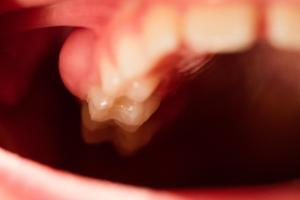Dental abscess
A dental abscess is a collection of pus that forms in your teeth or gums, as the result of a bacterial infection. Anyone with teeth can develop a dental abscess. Children and adults are equally affected.
Symptoms of dental abscess
The main symptom of a dental abscess is a severe, throbbing pain in your affected tooth or gum.
The pain usually:
- comes on suddenly
- may gradually get worse over a few hours or a few days
- causes teeth to be tender and sensitive
Sometimes the pain may spread to your ear, lower jaw and neck, on the same side as the affected tooth. There can also be severe swelling in the face, which can spread if the abscess is not treated.

Other symptoms can include:
- tenderness of your tooth and surrounding area
- sensitivity to very hot or cold food and drink
- an unpleasant taste in your mouth
- bad breath (halitosis)
- a general feeling of being unwell
- difficulty opening your mouth
- difficulty swallowing (dysphagia)
- disturbed sleep
- a high temperature (fever)
Treating dental abscesses
If you think you may have a dental abscess, you should see your dentist as soon as possible. Your GP can give you advice, but they cannot provide the treatment needed to cure an abscess.
Usually the only way to cure a dental abscess is with dental treatment.
When to seek immediate medical help
The following symptoms may mean the infection has spread to other parts of your body:
- swelling in your face
- a high temperature (fever) of 38°C (100.4°F) or above
- severe pain that does not respond to treatment with painkillers
- breathing difficulties
If you develop any of these symptoms and you are not due to see a dentist straight away, you will need to access emergency dental services.
You can find out more about dentists in Northern Ireland, including registering with a local health service dentist at:
- Seeing a dentist
- Dental abscess
More useful links
The information on this page has been adapted from original content from the NHS website.
For further information see terms and conditions.